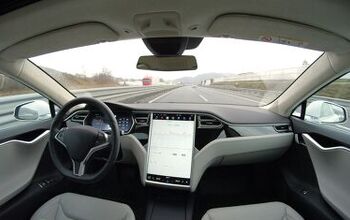Bailout Watch 550: Chrysler Sale Delayed By Supreme Court
Supreme Court Justice Ruth Bader Ginsburg has ordered that the sale of Chrysler to Fiat is “stayed pending further order,” reports the AP. “Was TARP money used illegally?” asks the WSJ Deal Journal. It won’t be easy to prove, is the professorial opinion. Oh, and did we mention that the Obama administration has filed a brief ( PDF via the excellent scotusblog) against the initial plea, arguing that TARP issues are out of bounds for the courts? Meanwhile, Fiat’s walk-away deadline of the 15th draws closer every minute. Hit the jump for Bader-Ginsburg’s inscrutable order (and more! Thanks for the tips!).
UPON CONSIDERATION of the application of counsel for the applicants, and the responses filed thereto, IT IS ORDERED that the orders of the Bankruptcy Court for the Southern District of New York, case No. 09-50002, dated May 31 and June 1, 2009, are stayed pending further order of the undersigned or of the Court.
TTAC contributer Richard Tilton tells the Wall Street Journal:
“We will probably see a request from Chrysler for an expedited briefing on whether the court should hear the appeal. The Supreme Court must still decide if they want to hear the appeal. I think this will now cast doubt on how the government is trying to restructure General Motors through the bankruptcy process.”
Scotusblog mulls the possibilities:
“Ginsburg or the Court may be waiting to see how the Second Circuit explains its decision to uphold the terms of the sale. The Circuit Court issued no opinion on Friday, indicating that such an explanation would come “in due course,” although the expectation was that one or more opinions would emerge from those judges on Monday.”
“The wording of Ginsburg’s order — “stayed pending further order” — is the conventional way by which a Justice or the Court carries out an action that is expected to be short in duration, and not controlling — or even hinting at — the ultimate outcome. Any speculation that her order meant the Court was leaning toward a further postponement would be unfounded.”
More by Edward Niedermeyer
Latest Car Reviews
Read moreLatest Product Reviews
Read moreRecent Comments
- Corey Lewis It's not competitive against others in the class, as my review discussed. https://www.thetruthaboutcars.com/cars/chevrolet/rental-review-the-2023-chevrolet-malibu-last-domestic-midsize-standing-44502760
- Turbo Is Black Magic My wife had one of these back in 06, did a ton of work to it… supercharger, full exhaust, full suspension.. it was a blast to drive even though it was still hilariously slow. Great for drive in nights, open the hatch fold the seats flat and just relax.Also this thing is a great example of how far we have come in crash safety even since just 2005… go look at these old crash tests now and I cringe at what a modern electric tank would do to this thing.
- MaintenanceCosts Whenever the topic of the xB comes up…Me: "The style is fun. The combination of the box shape and the aggressive detailing is very JDM."Wife: "Those are ghetto."Me: "They're smaller than a Corolla outside and have the space of a RAV4 inside."Wife: "Those are ghetto."Me: "They're kind of fun to drive with a stick."Wife: "Those are ghetto."It's one of a few cars (including its fellow box, the Ford Flex) on which we will just never see eye to eye.
- Oberkanone The alternative is a more expensive SUV. Yes, it will be missed.
- Ajla I did like this one.


































Comments
Join the conversation
This is also an issue of trust and honesty. The rule of law implies a level of trust between businesses, investors, workers, etc. as to how interactions should occur. Once the government (or any other party) breaks that trust, there are ripple effects that go beyond the smaller boundaries of this one situation. It's no different than when businesses interact without the government. Trust and honest matter. (For more thoughts: Honesty in Marketing.)